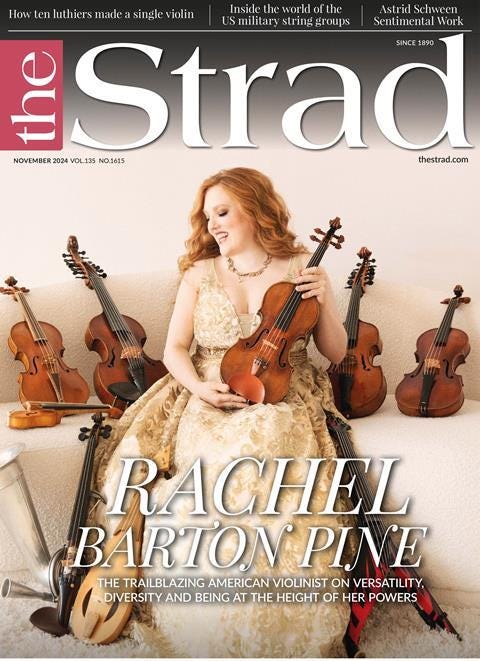‘It’s crazy to think that you might graduate not having the skill to do the job you’re going to be hired to do’ – an interview with Rachel Barton Pine
OUTTAKES The American violinist Rachel Barton Pine questions whether conservatoires are preparing young musicians for the reality of a life in music, and offers students her best advice
Rachel Barton Pine has one of the most eclectic, unconventional and interesting careers of all violinists – whether playing thrash-metal in Earthen Grave, advocating for works by female and black composers decades before it became the norm, putting her money where her mouth is with her philanthropy, or with a repertoire list that spans just about every era and genre, and includes many world premieres. I spoke to her for the cover of the November issue of The Strad about her new release of Corelli violin sonatas (in which she improvises and uses an authentic violin hold), but she had so much to say and some very frank opinions about music education…
Advice for young players – diversify, diversify, diversify
‘I give the same advice to every young artist these days, which is that diversifying your interests and abilities is key. I love this modern term ‘portfolio career’, because rather than thinking that being a freelancer is insecure, you’re instead making the analogy that it’s not very wise to put all your stock in one company. If you only play in that one orchestra and something happens, what are you left with? With the idea of doing some of this and some of that, a few things might evaporate but you’ve got others left.
I think it’s also the healthiest way to live from an artistic perspective: to play in some orchestras, do some chamber music, teach, try some new music or some early music or be part of a fiddle band. Most people balance their lives with a few things they do purely to earn money and a few other things that might not earn much money but that they find to be fulfilling. Always look at the totality of all that you’re involved in and make sure you’re feeling satisfied and invigorated. That’s what you should be looking for. I always encourage young artists not just to practise their concertos, excerpts and etudes, but to explore other kinds of music-making activities.
Even wedding string quartets these days are not only playing Pachelbel’s Canon and Eine Kleine – a lot of brides are asking for classical arrangements of pop songs. Some people hate that and wish they could just play Haydn quartets like the old days, and some people find a lot of pleasure in playing their favourite top 40 songs on their instrument for a bride. So explore the options and be very open-minded during your student years to really find out where you can slot in.’
Conservatoires are falling short of preparing students for real life
‘It used to be that no conservatoire anywhere taught community engagement and now many of them do, but it still seems surprising that there are still some that don’t. Teaching students how to talk to people at a homeless shelter or to kids in a kindergarten classroom, or how to speak from the stage to their audience at a concert – all those types of communication skills are so key. We should know how to do our jobs and it’s crazy to think that you might graduate not having the skill to do the job you’re going to be hired to do, but also because knowing how to do those things helps teach you those values of connecting with the public and finding ways to share the music more effectively.
There are entrepreneurship programmes, teaching people how to start their own charitable organisations and get their own little series going. Again, it’s great, but so often, it’s optional, which is a little concerning, because even if you don’t end up starting your own series, just to know what it takes enables you to interact better and understand who’s hiring you or those you’re collaborating with. It is very outtdated not to understand how the world in which you’re earning a living works.
Sometimes it almost seems that the most elite students do the least supplemental activities because they’re so advanced and virtuosic, and spend so many hours practising their Paganini Caprices that they aren’t going to pop in and join the Celtic jam. Those being our next generation of top professionals, they are the ones we need the most to have a broader understanding of music-making so their artistry can be nurtured to the best degree.’
Improvisation shouldn’t feel scary
‘As classical musicians, we’re not taught to improvise and a lot of players are quite scared of it. It’s so sad because what could be more natural than your own voice? Every time you converse, you’re not reading from a script. You’re literally improvising your sentences, and there’s no reason that it shouldn’t be just as comfortable and individual doing that with your music making. Not everybody has the gift to be a composer – I certainly don’t have any original melodies. But being an improviser is like being somebody who can talk to a friend, and we all do that, and we all can do that with music. It’s actually unnatural that that’s almost not allowed, or at least not encouraged.’
Authentic performance isn’t only for historic music
‘I’m a big proponent of studying American music, especially if you’re American. There are so many great works that people are starting to play by black composers. Black composers’ voices run the gamut – you don’t always hear black music in music by black composers and I don’t want to conflate that, but certainly, a number of composers do draw upon other types of black music, whether it’s blues, hip-hop or jazz. I have students coming to me for coaching who are playing works by Carlos Simon, Daniel Bernard Roumain or Coleridge-Taylor Perkinson and they don’t know how to do an appropriate blues slide, which is different from an expressive romantic shift or from the type of erhu derived slide that you might find in Chinese classical composition. It’s a particular type of slide with a particular speed, inflection. It’s a technique that comes from an understanding of a style and I find it very sad that you have American students playing American music who don’t understand the American roots music that it comes from. I would like to see that being more universally taught.’
Pedagogy is becoming too Olympic
‘It concerns me that as pedagogical training becomes ever more refined, there’s starting to be such a sport-like emphasis on the technique of violin playing. Whenever I see popular YouTubers discussing the violin, it’s always about which kid is younger, playing which harder piece, faster. I never hear these same YouTubers saying ‘Oh, wow, here’s an artist who really touched my heart.’ That’s the entire point of why we do what we do. We don’t do it to play notes fast. It worries me that we’re heading in this direction, where it’s all about, ‘I’m doing this hard piece and this hard piece’ and ‘Oh, look who can play this Caprice.’ I say that as a person who aspired as a youngster to see whether I could join the shortlist of people who performed the Paganini 24 caprices in a single evening’s concert, which I accomplished and have enjoyed doing over the years. I certainly enjoy and appreciate the sport-like side of violin playing, but to me, it’s always been secondary to the music – telling a story, getting in touch with your emotions and feelings and nurturing the soul of your audience through that expression.’
A strategy for staying in musical shape
‘I make sure there’s enough virtuoso repertoire in the mix. It’s super important to do the fundamentals, but alone, they don’t keep me in shape to play certain kinds of repertoire. Doing scales in thirds is different from playing a Wieniawski piece with lots of thirds in it, for example, so I rotate through repertoire, even when I’m not performing it, and not just virtuoso repertoire. If I’m not playing anything Impressionistic for a while, I might pull out Chausson’s Poème or Debussy’s Sonata so I don’t get rusty on those floaty sounds. I keep Bach, harder-edge 20th-century things and slurpy Romantic pieces in rotation, looking at each season in terms of what’s missing. If I’m not doing a Mozart concerto all year, I don’t want to lose that clean delicacy, so I might practise a Mozart concerto.
I break it down from the macro to the micro, so I’m always thinking in six-month chunks, because we have our naturally built-in Christmas break, and then we have a switch over in summer. So I always go in six month chunks and I think okay, maybe this day in September, I don’t need to be practising the thing I’m doing in two weeks but the piece I’m doing in two months, because I haven’t done it in ten years and I need to be woodshedding it now. I have to be super organised, making sure I’ve spent a certain amount of time with my instrument in my hands.’






Superb Ariane